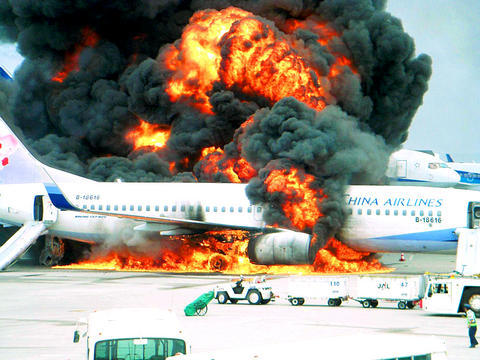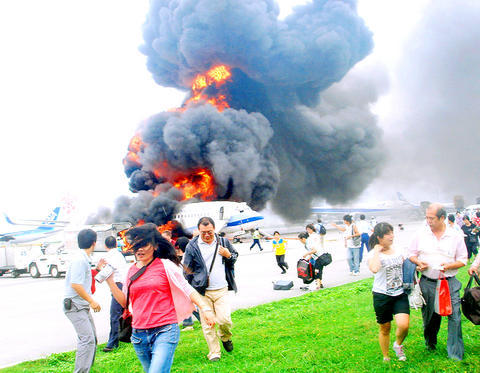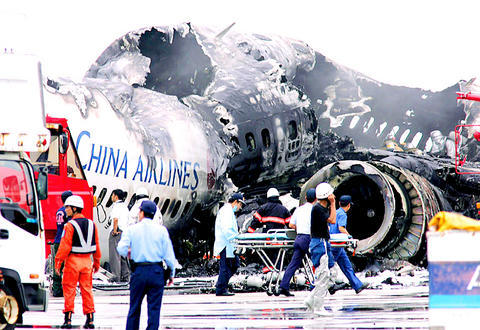A China Airlines Boeing 737-800 airliner burst into flames yesterday moments after landing on the Japanese island of Okinawa after all 165 passengers and crew made a dramatic escape.
Flames and giant plumes of black smoke erupted from the jet just after it landed at Naha Airport after a flight from Taipei.
"When we looked out the window, everything was covered with fire," an unidentified male passenger told reporters.

PHOTO: AP
"I saw several passengers evacuate the plane using a chute. After a minute or so, I heard the sound of an explosion. It was a big explosion," said Tadahiro Hasuo, who told Japanese TV network NHK he felt the heat of the blast while passing Naha airport in a taxi.
Video shot by an eyewitness and broadcast on TV showed passengers sliding down two chutes on the right side of the plane, while flames and thick black smoke billowed from the left.
Early investigations in Okinawa raised the possibility that leaking fuel may have caused the blaze.

PHOTO: AP
"We don't have any information that suggests the accident was linked to terrorism. There is a possibility of the engine catching fire and exploding due to a fuel leak," a Naha airport police official said.
One member of the ground crew had been injured, Kyodo news agency reported.
The flight landed using standard procedures and taxied to the designated gate, China Airlines spokesman Johnson Sun (孫鴻文) said at a news conference. The captain was later informed by the ground crew that one of the plane's engines was on fire and all 157 passengers and eight crew members were immediately evacuated by the emergency chutes, Sun said.

PHOTO: EPA
"We are very sorry and regret the accident," he said.
Following the explosion, the Civil Aviation Administration (CAA) and Aviation Safety Council (ASC) held press conferences in Taipei to assuage public fears.
CAA Director-General Billy Chang (張國政) said that based on Taiwan's Aviation Occurrence Investigation Act (飛航事故調查法), the authority to investigate the accident lay in Japan's Aircrafts and Railway Accidents Investigation Commission (ARAIC).
Nonetheless, the administration has formed a special task force and immediately dispatched three CAA officials to Japan to assist officials from the ARAIC in the investigation.
Chang said that the nation had 15 Boeing 737-800 model planes, 12 of which are owned by China Airlines, including the plane that burned in Okinawa. Two belong to Mandarin Airlines and one, Air Force One, is owned by the Air Force. He said that these planes had been grounded by the CAA for further inspection.
Chang said the plane that had caught fire was only five years old and had just completed its routine maintenance on July 13. He said that a preliminary investigation showed the flight's captain was informed by ground staff about the fire after the plane landed at the airport.
Meanwhile, four ASC representatives arrived at Okinawa yesterday evening to start working with ARAIC and China Airline representatives to identify the cause of the explosion.
China Airlines, Taiwan's largest carrier, purchased the B737-800 passenger jet in July 2002. The company uses the B737-800s in its fleet to fly mainly short-haul Asian routes.
James Fang (方粵強), the director of the ASC's investigation department, told the Taipei Times that this type of incident had never occurred in the past.
Most of the Taiwanese passengers on the plane had been on package tours arranged by four travel agencies in Taiwan -- South East Travel Service (東南旅行社), Gloria Tours (喜美旅行社), Daiei Travel Service (大榮旅行社) and Mic Travel Co (萬達旅行社). Their luggage was destroyed in the fire.
China Airlines said it would compensate passengers NT$1,000 per kilogram of luggage, with a maximum compensation of NT$20,000 in accordance with civil aviation regulations. Compensation for the passengers' mental suffering had not been decided.
China Airlines has a patchy safety record and this is the carrier's fourth accident in 13 years.
After devoting huge resources to improving safety and regaining public confidence, the company was starting to see some positive results.
Despite high aviation fuel costs, the company posted a net income of NT$738.35 million (US$22.5 million), or NT$0.20 per share, last year. Company chairman Philip Wei (魏幸雄) said its operating costs were lower because of a lower insurance premium, which was 45 percent less than what the carrier used to pay, because of its better flight safety record.
But the carrier is once again under fire over the accident in Okinawa. The airlines' already ailing finances will be also affected by the loss. For the first quarter of the year, the carrier reported a loss of NT$805.83 billion, or negative NT$0.21 per share.
Following the accident, China Airlines president Ringo Chao (趙國帥) led a team to Okinawa.
During a press briefing last night, Chao said he regretted the accident and appreciated the aid offered by Japanese authorities.
Chao also said the company was uncertain of the cause of the explosion and would rely on the findings of investigators.
The last accident involving China Airlines was on May 25, 2002, when a Boeing 747-200 broke up and crashed into the sea near the Penghu Islands 20 minutes after takeoff from Taipei on a flight to Hong Kong. The crash caused the death of all 206 passengers and 19 crew members.
Meanwhile, the Air Force yesterday said that it would carry out stricter maintenance on Air Force One, which is also a 737-800.
"Because of a request from the Civil Aeronautics Administration, we will carry out a special detailed check on the aircraft as soon as possible," said Lieutenant General Jason Liu (
Additional reporting by Jimmy Chuang

CHAOS: Iranians took to the streets playing celebratory music after reports of Khamenei’s death on Saturday, while mourners also gathered in Tehran yesterday Iranian Supreme Leader Ayatollah Ali Khamenei was killed in a major attack on Iran launched by Israel and the US, throwing the future of the Islamic republic into doubt and raising the risk of regional instability. Iranian state television and the state-run IRNA news agency announced the 86-year-old’s death early yesterday. US President Donald Trump said it gave Iranians their “greatest chance” to “take back” their country. The announcements came after a joint US and Israeli aerial bombardment that targeted Iranian military and governmental sites. Trump said the “heavy and pinpoint bombing” would continue through the week or as long

TRUST: The KMT said it respected the US’ timing and considerations, and hoped it would continue to honor its commitments to helping Taiwan bolster its defenses and deterrence US President Donald Trump is delaying a multibillion-dollar arms sale to Taiwan to ensure his visit to Beijing is successful, a New York Times report said. The weapons sales package has stalled in the US Department of State, the report said, citing US officials it did not identify. The White House has told agencies not to push forward ahead of Trump’s meeting with Chinese President Xi Jinping (習近平), it said. The two last month held a phone call to discuss trade and geopolitical flashpoints ahead of the summit. Xi raised the Taiwan issue and urged the US to handle arms sales to

BIG SPENDERS: Foreign investors bought the most Taiwan equities since 2005, signaling confidence that an AI boom would continue to benefit chipmakers Taiwan Semiconductor Manufacturing Co’s (TSMC, 台積電) market capitalization swelled to US$2 trillion for the first time following a 4.25 percent rally in its American depositary receipts (ADR) overnight, putting the world’s biggest contract chipmaker sixth on the list of the world’s biggest companies by market capitalization, just behind Amazon.com Inc. The site CompaniesMarketcap.com ranked TSMC ahead of Saudi Aramco and Meta Platforms Inc. The Taiwanese company’s ADRs on Tuesday surged to US$385.75 on the New York Stock Exchange, as strong demand for artificial intelligence (AI) applications led to chip supply constraints and boost revenue growth to record-breaking levels. Each TSMC ADR represents

State-run CPC Corp, Taiwan (CPC, 台灣中油) yesterday said that it had confirmed on Saturday night with its liquefied natural gas (LNG) and crude oil suppliers that shipments are proceeding as scheduled and that domestic supplies remain unaffected. The CPC yesterday announced the gasoline and diesel prices will rise by NT$0.2 and NT$0.4 per liter, respectively, starting Monday, citing Middle East tensions and blizzards in the eastern United States. CPC also iterated it has been reducing the proportion of crude oil imports from the Middle East and diversifying its supply sources in the past few years in response to geopolitical risks, expanding